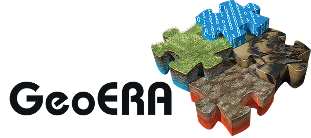Eventful hydrogeological investigations
Mitja Janza (GeoZS), 25 March 2021
Goals and results of the field measurements
Aim of the hydrogeological investigations was to estimate the geothermal potential of the open-loop system that is planned for the heating of a primary school in Ljubljana. Retrofitting the school is part of the public-private partnership energy retrofit project of the City of Ljubljana. The planned capacity of the heat pump is 200 kW and will be primary source of heating (planned demand 340 MWh for heating and 95 MWh for domestic hot water). Required water flow rate for the heat pump is 15 l/s.
Research focused on the characterization of the aquifer and design of a well that will assure required pumping rate. To avoid risks of clogging and corrosion, the chemical composition of groundwater was analysed. The borehole logging (Fig. 1) showed favourable hydrogeological conditions which were later confirmed with pumping tests (Fig. 2). The temperature of the groundwater is around 13 oC and has very low Fe2+ and Mn content, therefore it is a suitable heat source for the planned heat pump.
The measurements conducted in the test site provided new data on the subsurface conditions, particularly on aquifer and groundwater properties, which will help in planning of new geothermal installations in the Ljubljana pilot area.


Unexpected incident during drilling
During the drilling and cleaning of the well, muddy water appeared in the test site (left in Fig. 3) and was drained to the sewer system with the outflow to the open channel (right in Fig. 3). We have not been aware of this fact, until police came and stopped the drilling. Explanations and assurance that no harmful impacts on environment will be caused had to be given before we could continue the work. This case shows that hydrogeological explorations and the process of installing a geothermal system in urban areas have a big need for communication with the stakeholders and all potential impacts have to be considered, even harmless ones, because they might look suspicious to uniformed passers-by.

Find out more about the pilot area Ljubljana in our previous blog: Pilot area activities – #8 Hydrogeological and geothermal surveys in Ljubljana, Slovenia
Other MUSE Posts:
- Brand-new MUSE results: Fact sheets on shallow geothermal energy concepts
- Explore the new MUSE YouTube channel
- MUSE co-organized the Shallow Geothermal Days 2020
- MUSE – Monitoring Closed-loop systems and Open-loop systems
- MUSE – Geothermal heat pumps, a highly dynamic market in Europe!
- MUSE and the underground urban heat island effect
- MUSE – Open-loop systems requirements & advantages
- MUSE – Web-based information systems for shallow geothermal energy
- MUSE – Closed-loop systems requirements & advantages
- MUSE results published in Energy Policy
- MUSE – Differences between deep and shallow geothermal energy
- Legal framework, procedures and policies of shallow geothermal energy use in the EU and MUSE partner countries
- BBC article about MUSE activities in Cardiff
- Pilot area activities – #14 Assessment of shallow geothermal energy resources in Warsaw agglomeration, Poland
- Pilot area activities – #13 Geophysical survey and groundwater monitoring in Brussels, Belgium
- MUSE at “EGU2020: Sharing Geoscience Online” – Free online geoscience conference
- Pilot area activities – #12 Thermal groundwater use in the urbanized area of Zagreb, Croatia
